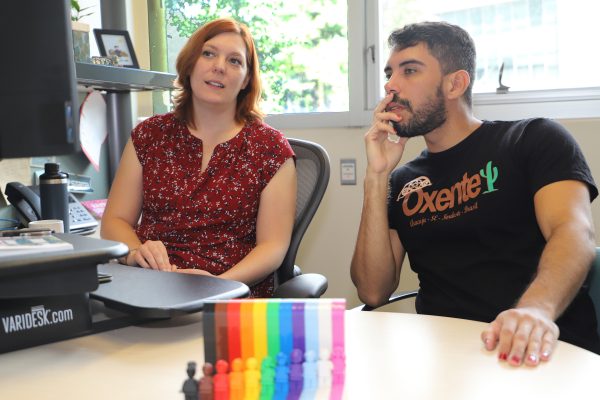
Family acceptance is a crucial component of healthy development during adolescence, especially for sexual and gender minority (SGM) youth who often fear rejection from family members.
In a recent publication, Amanda Pollitt, assistant professor in Northern Arizona University Department of Health Sciences and the Center for Health Equity Research; Jessica N. Fish, University of Maryland Department of Family Science, Prevention Research Center; and Ryan J. Watson, University of Connecticut Department of Human Development and Family Sciences, found that youth who had disclosed their sexual or gender identity to their families reported greater acceptance and less rejection than non-disclosed youth.
Despite this finding, the authors also discovered that families showed varying degrees of acceptance in their responses among disclosed youth. Their publication, titled “Measurement Equivalence of Family Acceptance/Rejection Among Sexual and Gender Minority by Disclosure Status,” appeared in the Journal of Family Psychology, and explores the essential nuances in family dynamics that could uniquely shape SGM youth development, health, and family relationships.
“This work is important because it helps us better understand the complexities of family relationships for SGM youth,” Pollitt said. “Typically, research has described parent/caregiver responses to their child’s sexual or gender identity as simply either rejecting or accepting. Instead, we found that SGM youth experience rejection and acceptance from parents or caregivers to varying degrees, rather than as two sides of the same coin, so to speak.”
In their study, researchers used data from a national non-probability sample of 9,127 SGM youth—6,683 who had disclosed their sexual or gender identities or both to parents and 2,444 who had not disclosed—to test the factor structure of an eight-item measure of family acceptance and rejection and differences by disclosure status.
These measures included items about whether youths’ parents or caregivers mocked them or made them feel bad about being LGBTQ, or whether they made negative comments or said bad things about LGBTQ people (rejection); and whether youth’s parents/caregivers said they liked them or were proud of them for being LGBTQ, whether they considered them a role model for being LGBTQ, or whether they were involved with LGBTQ people or issues (acceptance).
Differences among disclosed and undisclosed SGM youth
The author’s findings suggest that research on the SGM youth family environment must examine both supportive and undermining behaviors that the youth experience based on disclosure of their sexual or gender identity.
They learned that family acceptance and rejection of the youth are strongly associated with the SGM youth’s well-being, including mental health and suicidality, and that high-quality relationships with parents during adolescence protect health even when these relationships are strained.
They also found that parental ambiguity—mixed signals of accepting and rejecting behaviors toward SGM youth’s identities—can be common, particularly among transgender youth. Previous research has shown that family ambiguity has negative impacts on health and is most harmful to mental and physical health, even more than environments characterized by high levels of rejection and low levels of acceptance.
Pollitt said that taken together, previous work suggests that strong, clear displays of acceptance are the most beneficial for the mental health of SGM youth. Since acceptance is the healthiest environment for SGM youth, future research should evaluate the acceptance or rejection of SGM youth’s sexual orientation or gender identity by their families, and it must include an examination of ambiguity and explore whether the SGM youth is experiencing microaggressions or other contradictory behaviors when evaluating the youth’s family environment.
“This research sets the stage for further work on the complexities of family relationships for SGM youth and how these relationships influence how SGM youth develop across the life span,” Pollitt said.
This research was supported in part by an NIMHD center grant to the Southwest Health Equity Research Collaborative at Northern Arizona University (U54MD012388) as well as:
- T32 HD007081/HD/NICHD NIH HHS/United States
- P2C HD042849/HD/NICHD NIH HHS/United States
- P2C HD041041/HD/NICHD NIH HHS/United States
- F32 AA025814/AA/NIAAA NIH HHS/United States
- K01 DA047918/DA/NIDA NIH HHS/United States